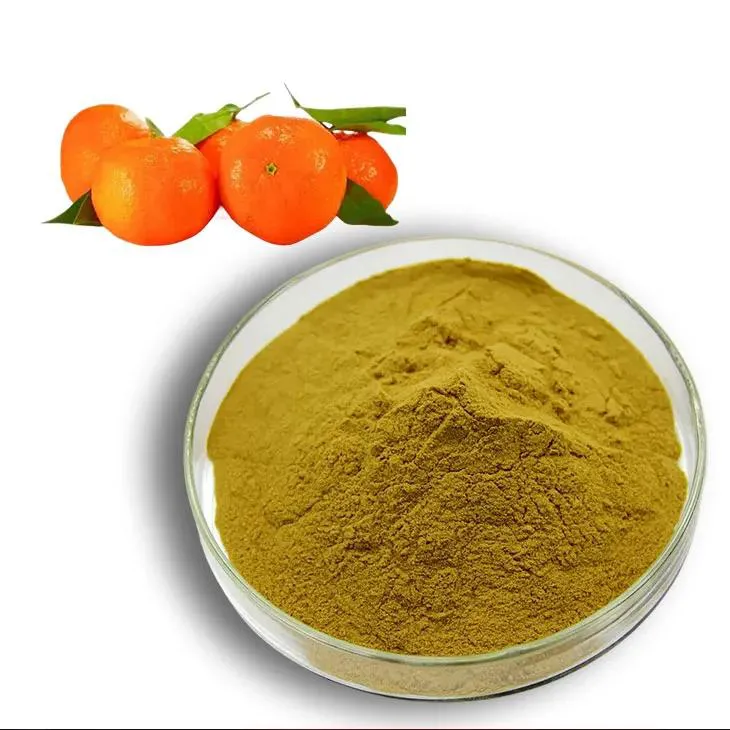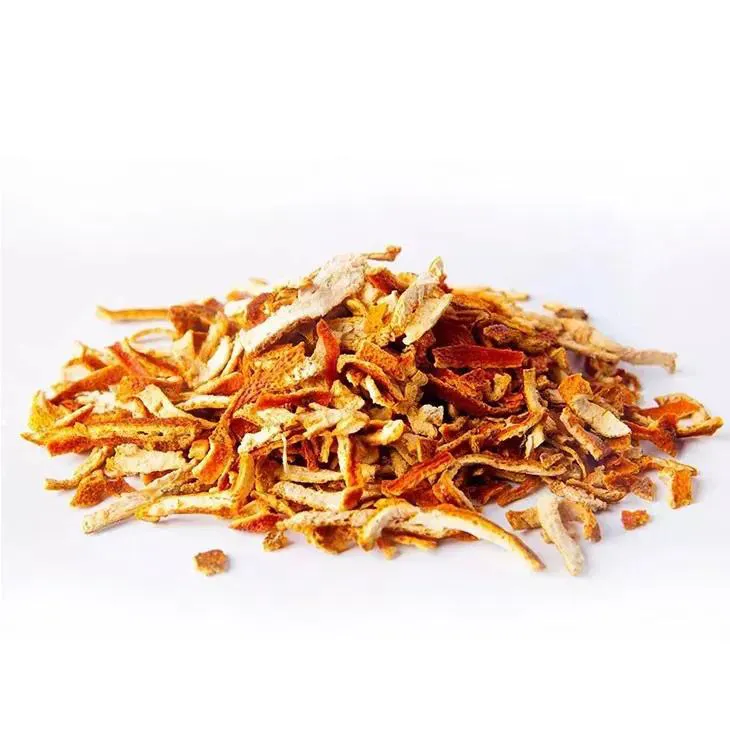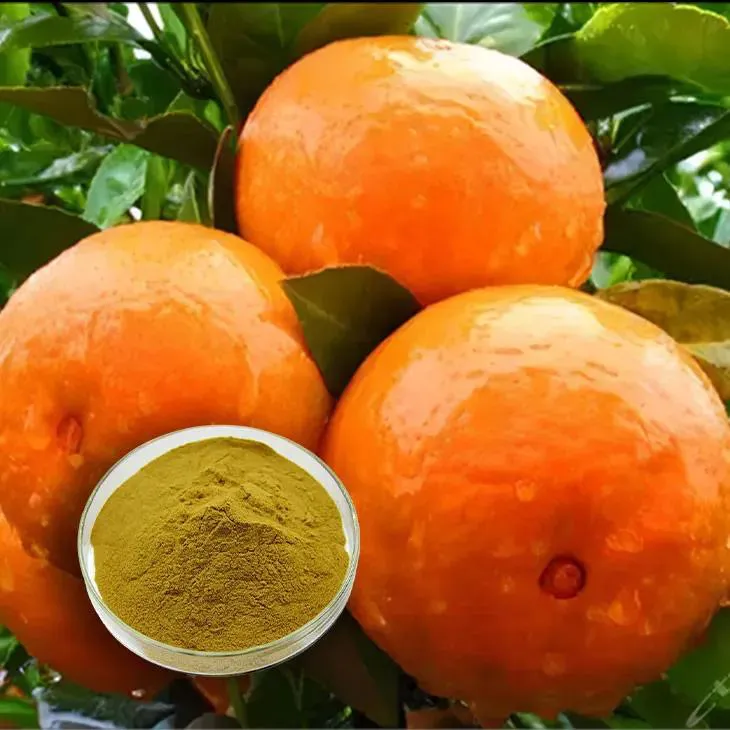- 0086-571-85302990
- sales@greenskybio.com
The most highly - praised citrus bioflavonoids.
2024-11-27

Introduction
Citrus bioflavonoids have been increasingly recognized as important components in the realm of health and nutrition. These natural compounds, which are abundant in citrus fruits such as oranges, lemons, and grapefruits, are garnering significant attention for their potential health benefits. Among them, certain bioflavonoids are particularly highly - praised due to their diverse and impactful properties.

Benefits for Digestion: NeoHesperidin as an Example
NeoHesperidin, one of the notable Citrus bioflavonoids, has unique properties that are highly beneficial for the digestive system. It can stimulate the secretion of digestive juices, which is crucial for the proper breakdown and absorption of food. When we consume food, the digestive process begins in the mouth with the secretion of saliva, and continues in the stomach and intestines with the release of various digestive enzymes and juices. NeoHesperidin plays a role in enhancing this process.
For instance, in the stomach, it can help in the breakdown of proteins by promoting the secretion of gastric juices. In the small intestine, it may also contribute to the absorption of nutrients by ensuring that the environment is conducive to the action of digestive enzymes. This not only aids in the digestion of food but also helps in preventing digestive disorders such as indigestion, bloating, and constipation.

Role in Preventing Neurodegenerative Diseases
Protecting Neurons from Damage
Citrus bioflavonoids are also being intensively studied for their role in preventing neurodegenerative diseases. One of the key mechanisms through which they may offer protection is by safeguarding neurons from damage. Neurons are the fundamental building blocks of the nervous system, and any damage to them can lead to a variety of neurological problems.
Some citrus bioflavonoids have antioxidant properties. Antioxidants are substances that can neutralize free radicals, which are unstable molecules that can cause oxidative stress and damage to cells, including neurons. By reducing oxidative stress, these bioflavonoids can help maintain the integrity of neurons and prevent their premature death.
Interactions with Other Nutrients in the Body
Another important aspect of citrus bioflavonoids is their interaction with other nutrients in the body. They can enhance the overall bioavailability of vitamins and minerals. For example, they may help in the absorption of vitamin C, which is also abundant in citrus fruits. Vitamin C is an essential nutrient that plays a crucial role in various physiological processes, including immune function, collagen synthesis, and antioxidant protection.
When citrus bioflavonoids are present, they can improve the absorption of vitamin C in the intestine. This is because they can prevent the degradation of vitamin C and also enhance the transport of vitamin C across the intestinal wall. Similarly, they may also interact with minerals such as calcium and iron, increasing their absorption and utilization in the body.

Types of Highly - Praised Citrus Bioflavonoids
There are several types of citrus bioflavonoids that are highly - praised for their health - promoting properties.
- Hesperidin: Hesperidin is one of the most common citrus bioflavonoids. It has been shown to have anti - inflammatory properties. Inflammation is a natural response of the body to injury or infection, but chronic inflammation can lead to various diseases such as heart disease, diabetes, and arthritis. Hesperidin can help reduce inflammation by inhibiting the production of inflammatory mediators in the body.
- Naringenin: Naringenin is another important citrus bioflavonoid. It has been studied for its potential in regulating lipid metabolism. High levels of lipids in the blood, such as cholesterol and triglycerides, are associated with an increased risk of cardiovascular diseases. Naringenin may help lower lipid levels by interfering with the synthesis and absorption of lipids in the body.
- Rutin: Rutin is known for its antioxidant and anti - platelet aggregation properties. Platelet aggregation is the process by which platelets stick together and form blood clots. While blood clotting is necessary to prevent excessive bleeding, abnormal platelet aggregation can lead to thrombosis, which can cause heart attacks and strokes. Rutin can help prevent abnormal platelet aggregation, thereby reducing the risk of cardiovascular events.
Research and Studies on Citrus Bioflavonoids
There have been numerous research and studies on citrus bioflavonoids to explore their potential health benefits.
- In - vitro studies: Many in - vitro studies have been conducted to investigate the biochemical properties of citrus bioflavonoids. These studies involve testing the effects of bioflavonoids on cells in a laboratory setting. For example, researchers may study how bioflavonoids interact with neurons or immune cells in a petri dish to understand their mechanisms of action.
- Animal studies: Animal studies are also an important part of citrus bioflavonoid research. Scientists may feed animals a diet supplemented with citrus bioflavonoids and then observe the effects on their health. For instance, in studies on rats, they may look at how bioflavonoids affect the rats' blood lipid levels, antioxidant status, or cognitive function.
- Human clinical trials: Human clinical trials are the most conclusive way to determine the health benefits of citrus bioflavonoids. These trials involve recruiting human subjects and giving them either a placebo or a supplement containing citrus bioflavonoids. The researchers then monitor the subjects' health parameters over a period of time. For example, in a clinical trial on the effects of hesperidin on blood pressure, the researchers would measure the blood pressure of the subjects before and after the intervention.
Conclusion
Citrus bioflavonoids are indeed highly - praised elements in the field of health and nutrition. Their diverse properties, such as benefits for digestion, role in preventing neurodegenerative diseases, and interactions with other nutrients, make them a valuable addition to a healthy diet. With continued research and studies, we are likely to uncover even more potential health benefits of these natural compounds. It is important for individuals to be aware of the presence of citrus bioflavonoids in citrus fruits and consider incorporating more of these fruits into their diet for optimal health.
FAQ:
What are the main benefits of citrus bioflavonoids?
Citrus bioflavonoids have multiple benefits. For digestion, some like neohesperidin can stimulate the secretion of digestive juices. They are also studied for their role in preventing neurodegenerative diseases by protecting neurons from damage. Additionally, they interact with other nutrients to enhance the overall bioavailability of vitamins and minerals.
Why is neohesperidin getting more attention among citrus bioflavonoids?
Neohesperidin is getting more attention because it has unique properties that are beneficial for digestion. It can stimulate the secretion of digestive juices, which is an important function for maintaining good digestive health.
How do citrus bioflavonoids prevent neurodegenerative diseases?
Certain citrus bioflavonoids may prevent neurodegenerative diseases by protecting neurons from damage. However, the exact mechanisms are still under research and may involve complex interactions within the body.
Can citrus bioflavonoids improve the absorption of other nutrients?
Yes, they can. Citrus bioflavonoids interact with other nutrients in the body, which enhances the overall bioavailability of vitamins and minerals. This means they can help the body absorb and use these nutrients more effectively.
What are the most highly - regarded citrus bioflavonoids?
One of the highly - regarded citrus bioflavonoids is neohesperidin. However, there are others as well that are being studied for their various health - promoting properties.
Related literature
- Title: The Role of Citrus Bioflavonoids in Health"
- Title: "Citrus Bioflavonoids: A Review of Their Potential Benefits"
- Title: "Neohesperidin and Its Significance in Digestion and Health"
- ▶ Hesperidin
- ▶ Citrus Bioflavonoids
- ▶ Plant Extract
- ▶ lycopene
- ▶ Diosmin
- ▶ Grape seed extract
- ▶ Sea buckthorn Juice Powder
- ▶ Fruit Juice Powder
- ▶ Hops Extract
- ▶ Artichoke Extract
- ▶ Mushroom extract
- ▶ Astaxanthin
- ▶ Green Tea Extract
- ▶ Curcumin
- ▶ Horse Chestnut Extract
- ▶ Other Product
- ▶ Boswellia Serrata Extract
- ▶ Resveratrol
- ▶ Marigold Extract
- ▶ Grape Leaf Extract
- ▶ New Product
- ▶ Aminolevulinic acid
- ▶ Cranberry Extract
- ▶ Red Yeast Rice
- ▶ Red Wine Extract
-
Ginger Extract
2024-11-27
-
Chasteberry Extract
2024-11-27
-
Motherwort Extract
2024-11-27
-
Marigold Extract
2024-11-27
-
Curcuma Longa Extract
2024-11-27
-
Apricot Powder
2024-11-27
-
Yam Extract
2024-11-27
-
Giant Knotweed Extract
2024-11-27
-
Chaste Berry Extract
2024-11-27
-
Hops Extract
2024-11-27





















